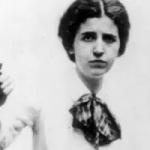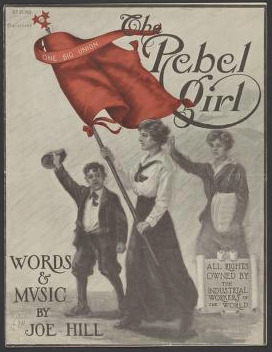Elizabeth Gurley Flynn Reminds Us How Civil Liberties and Collective Action Go Hand in Hand

Elizabeth Gurley Flynn is one of the most important and dynamic champions of worker power in U.S. history. For nearly six decades, from 1906 to 1964, she devoted herself to what she called “the working-class movement.” Inspired by the Irish freedom struggle and appalled by the exploitation and grinding poverty she saw around her, Flynn organized workers into unions, led strikes in a variety of industries, supported anti-imperialist and anti-colonial movements around the globe, galvanized resistance to fascism, protested deportation of immigrants, advocated for prison reform, championed labor and political rights for women, fought for civil rights for Blacks, and defended civil liberties for labor activists of all stripes.
My forthcoming book "Elizabeth Gurley Flynn: The Rebel Girl, Democracy, and Revolution" is not the first biography of Flynn, but my approach to telling her story differs from earlier books in that I place in the foreground Flynn’s commitment to civil liberties as a characteristic and enduring element of her activism and a force that shaped her life. My assumption throughout the book is that civil liberties work is a through line that connects the various phases of Flynn’s political career and the different campaigns in which she was involved. From her early days as a Socialist to her Wobbly years, her active involvement in the American Civil Liberties Union (she was a founding member), and her membership in the Communist Party of the United States (CPUSA) (which got her expelled from the ACLU), Flynn was a trailblazer in the American civil liberties movement. She was an ardent and active defender of the right to hold and express one’s own political views and to associate with like-minded people in peaceful pursuit of economic, social, and political change. Rather than surrender responsibility for civil liberties to the courts, she advocated and practiced what legal scholar Larry Kramer has called “popular constitutionalism,” the idea that ordinary people are able to define and protect their rights through vigorous debate of the Constitution and active supervision of the judiciary.
Flynn’s understanding of civil liberties was inseparable from her politics. She believed that freedom of speech, press, assembly, and the right to a fair trial by jury are necessary for democracy. However, she did not advocate for civil liberties as a matter of individual rights. On the contrary, she recognized that in a capitalist state such as the United States, where material resources are unevenly distributed, some individuals, typically members of the capitalist class, wield greater power than others, typically members of the working class. The only way to remedy the imbalance of power between these “haves” and “have nots” is collective action by the latter. Collective action is impossible without civil liberties. In other words, without guarantees of free speech, press, assembly, and a fair trial, workers could not possibly hold union drives, conduct strikes, organize against exploitation, resist oppression, advocate for worker-friendly policies, or do any of the things required to secure basic needs and a share of the good life, what labor activists poetically refer to as “bread and roses.”

Elizabeth Gurley Flynn, Library of Congress
In her younger days, Flynn toyed with the idea of becoming a constitutional lawyer. It is hard to imagine her poring over legal tomes, preparing memoranda, filing briefs, and the like. Such tasks were not where her talent lay nor where her heart led her. She was an orator, and what an orator she was! After she joined the Industrial Workers of the World (IWW)(known to some as the “Wobblies”), she quickly became one of the union’s most popular figures, drawing crowds on street corners and in meeting halls, and making headlines in the press nearly everywhere she went. Flynn’s youth and beauty undoubtedly contributed to her appeal, but it was her capacity to connect with an audience, to communicate empathy and compassion along with compelling arguments, witty observations, and forceful emotional appeals, and her obvious and unshakeable faith in the dignity and goodness of the working class that made her truly remarkable. Numerous individuals recalled being profoundly moved by the experience of hearing young Elizabeth Gurley Flynn speak, sometimes decades after the occasion.
Unlike youth and beauty, Flynn’s affability and talent for connecting with audiences did not desert her with age, although in her later years with the CPUSA her audiences were more likely to be readers of a pamphlet, magazine article, or column for the Daily Worker than listeners of a speech. But even as the bulk of her work shifted from speech to writing, Flynn retained the audience-centered perspective of an orator. Her language was simple and straightforward, but never patronizing. She never trafficked in abstract theoretical concepts at the expense of concrete, experiential realities. She appreciated her audience’s intelligence, whatever their level of formal education, but also understood their need to feel as well as think. In short, she liked and respected her working-class audiences, and they, in turn, liked and respected her.
That Flynn was a talented orator is of central importance to my telling of her story. It helps explain her popularity, her success as an organizer, strike leader, and fundraiser for numerous labor defense campaigns, and her overall approach to civil liberties. For Flynn, speech was not an abstraction; it was a type of action without which organizing, striking, labor defense campaigns, and all other forms of collective political action were impossible. Like many socialists of her generation, she saw freedom of speech and all First Amendment rights as part of the United States’ revolutionary legacy. She consistently used the language and symbolism of Americanism to claim that revolutionary legacy for working-class movements.
As befits an activist for whom civil liberties were inextricably tied to the class war, the book is organized around the various “battles” that Flynn fought in defense of First Amendment rights. Among the topics I cover are her leadership of free speech fights in Missoula, Montana; Spokane, Washington; and Paterson, New Jersey from 1909 to 1915. These fights sparked a conversation about civil liberties that reverberated around the United States and the globe. I also examine her advocacy for labor activists arrested and imprisoned under the Espionage Act during World War I, part of a global effort on behalf of political prisoners connected to labor and anti-colonial movements throughout the United States and Europe, as well as in India and Mexico. The book covers Flynn’s major contributions to civil liberties in the 1920s and 1930s as a founding member of the ACLU and an anti-fascist, and her controversial expulsion from that organization in 1940. That act fed the juggernaut of the Cold War by granting the seal of liberal approval to anti-Communism. I also explore Flynn’s opposition to repression of the CPUSA and her increasing involvement in the struggle for Black liberation, specifically her opposition to practices such as police brutality, housing discrimination, lynching, and the poll tax. Further, I discuss Flynn’s leadership of defense campaigns during the Smith Act trials of CPUSA leaders – including herself – in New York. Finally, the book covers the last few decades of her career after her release from federal prison, where she was sent following her Smith Act conviction, during which she continued to fight against political repression and for the right to travel, which she undertook when the State Department revoked her passport.

Although she was beloved by workers and enormously popular inside and outside labor circles during her lifetime, the Cold War and anti-Communism have largely erased Flynn from public memory. My aim for the book is to revive Flynn’s story and her reputation, to give readers a sense of the extraordinary work she did to defend the rights of speech, press, assembly, and a fair trial for labor activists of all kinds, and in so doing, to demonstrate why a robust defense of the First Amendment – not just in theory, but in practice – is necessary for the functioning of democracy in a capitalist state. Flynn knew that workers can only build power and enjoy full democratic participation in the workplace and in society when they are free to organize and speak out collectively against the forces arrayed against them. The struggle to claim and hold that freedom would need to be waged again and again. At a time when civil liberties are hanging by a string, and the institutions that working people have come to rely on to pursue justice for themselves are being gutted, Flynn’s life and career are a wellspring of inspiration for organizing and creating multi-ethnic, multi-racial alliances in the U.S. and among workers around the world. She is a model for the kind of audacious, fierce, brave, and militant activist who can meet this moment and win.
Mary Anne Trasciatti is an activist, scholar, and editor. She is President of the Triangle Fire Coalition, and a Professor of Rhetoric and Director of the Labor Studies program at Hofstra University in Long Island. Her latest book, "Elizabeth Gurley Flynn: The Rebel Girl, Democracy, and Revolution" will be published in June 2025 by Rutgers University Press.
Sustained and effective worker power arises out of collective action. By building self-funding, democratic organizations, America’s workers can confront and influence powerful forces, including employers, Wall Street, and the government. Our goal at Power At Work is to contribute to a discourse in the United States that emphasizes the importance of collective action and puts workers and worker power at the center of that conversation.
